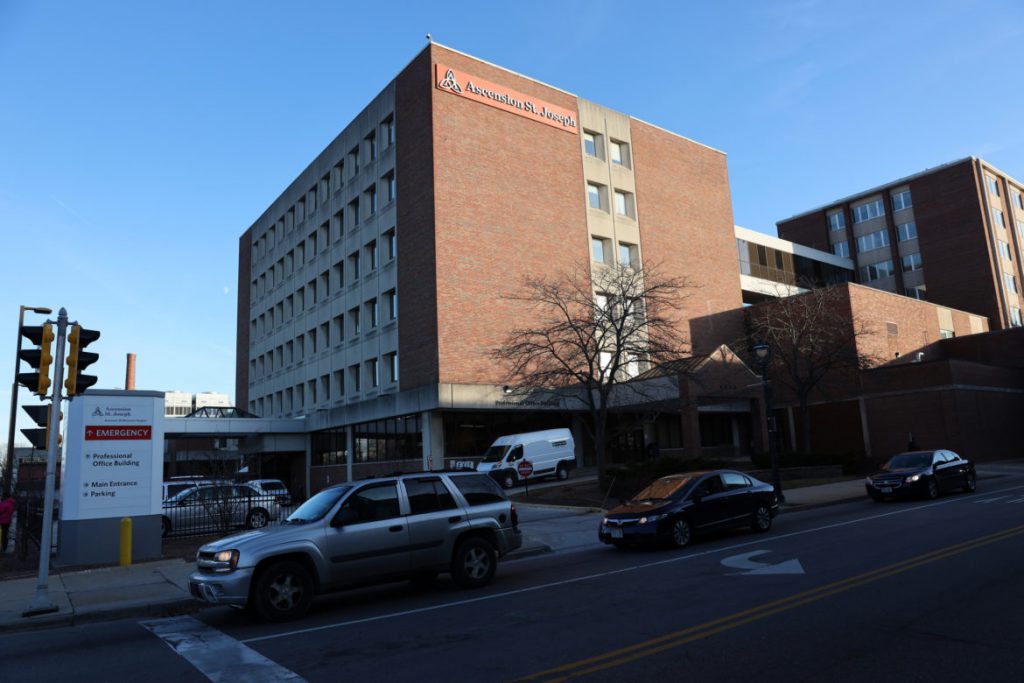Not Too Late to Expand Medicaid
Will extend coverage to 91,000 more people, save taxpayers $1.3 billion.

Ascension SE Wisconsin Hospital–St. Joseph Campus in Milwaukee. File photo by Coburn Dukehart / Wisconsin Watch.
The proposed expansion of BadgerCare would help thousands of uninsured, low-wage workers and yield huge savings for Wisconsin taxpayers. Despite these facts, Republican legislators once again removed it from the budget bill that was signed by Gov. Tony Evers. But, this proposal will keep coming back — because it is imperative that we help more Wisconsinites gain access to health care. And the reality is that arguments against expanding BadgerCare simply don’t hold up.
There is strong public support for expanding the program and taking the increased federal assistance that would more than pay for the state’s costs. Let’s review the facts that are widely agreed upon:
- Expanding BadgerCare would help about 91,000 low-wage workers, roughly half of whom are currently uninsured.
- Because states that increase eligibility qualify for additional federal funding, expanding BadgerCare would save Wisconsin taxpayers about $300 million per year.
- On top of those annual savings, the American Rescue Plan contains a larger, but short-term bonus for increasing health insurance access, which would reduce Wisconsin spending for Medicaid and BadgerCare by slightly more than $1 billion over a two-year period.
Opponents of BadgerCare expansion do not dispute those facts, but they contend that things work fine the way they are and there’s no need to help low-wage workers get health insurance. But there are more than 90,000 Wisconsinites that know better. In addition, Republicans do not acknowledge that the savings for state taxpayers will be long-term.
The argument that those savings will be temporary has been grounded in the false assumption that the Affordable Care Act and its funding for expansion states will be struck down by the Supreme Court or repealed by Congress.
However, even with the ACA in place, there remains a need to fill an affordability gap in Wisconsin. During debate on the budget bill, the central Republican argument against expansion was that it’s unneeded because low-wage workers can get health insurance coverage with very low or no premiums from the federal Marketplace created by the ACA.
While that may be true for some, there are two huge holes in that line of argument, causing thousands to fall through the cracks:
1) Not all workers who would benefit from BadgerCare expansion are eligible for subsidized Marketplace plans, and
2) Even if they are eligible for those subsidies, other costs can make those plans unaffordable for many people with incomes near the poverty level.
To assess whether the status quo is adequate for low-wage workers, one needs to keep in mind the income of the people who would get BadgerCare coverage if it were expanded. Single adults without children are currently ineligible for BadgerCare if they earn at least the minimum wage and work at least 34 hours per week. Single parents with one child are currently ineligible if they have a full-time job that pays more than $8.38 per hour! Increasing those income limits through BadgerCare expansion would assist many families and individuals struggling to make ends meet.
Yet another problem with the argument that the status quo is fine for Wisconsin’s low-wage workers is that the people making that claim are either unaware or do not acknowledge that many are ineligible for Marketplace subsidies because they have an offer of health insurance through an employer.
Under the terms of the ACA, a worker and their spouse cannot purchase a subsidized Marketplace plan if the worker could buy an employer plan with premiums that are less than 9.83% of the household’s income. Even in the not-uncommon cases when a plan has very high copays and deductibles, or when a family plan that would include the worker’s spouse has premiums far above 9.83% of their income, they are still ineligible for help from the Marketplace.
Imagine having a chronic health condition and a job that pays just $8 or $9 per hour. Your employer offers health insurance, but as we know, there are more costs to consider: the plan requires you to pay hundreds or even thousands to cover your medication and treatment, on top of premiums that cost 9.5% of your meager income. When all is paid, you don’t have much left to cover the cost of rent, food, utilities and transportation.
Your employer plan isn’t an affordable option, but it disqualifies you from being eligible for a subsidized plan through the ACA Marketplace. Expanding BadgerCare would keep people in this situation from falling through the cracks by ensuring they can access comprehensive health insurance with little or no out-of-pocket costs.
We owe it to ourselves to make health insurance more affordable for low-wage workers, and to capture the increased federal funding that roughly two-thirds of the other states are receiving. BadgerCare expansion would accomplish those very important and popular objectives, and the counter-arguments don’t hold up.
It’s not too late — but it’s time to stop playing political games and make sure Wisconsin takes care of our own.
It’s not too late for BadgerCare expansion was originally published by the Wisconsin Examiner.
Jon Peacock, policy director for Kids Forward.
William Parke-Sutherland, is the health policy analyst at Kids Forward.
Op-Ed
-
Wisconsin Candidates Decry Money in Politics, Plan to Raise Tons of It
 Dec 15th, 2025 by Ruth Conniff
Dec 15th, 2025 by Ruth Conniff
-
Trump Left Contraceptives to Rot; Women Pay the Price
 Dec 8th, 2025 by Dr. Shefaali Sharma
Dec 8th, 2025 by Dr. Shefaali Sharma
-
Why the Common Council’s Amended Budget is Good Policy for Milwaukee
 Nov 20th, 2025 by Alds. Marina Dimitrijevic and Russell W. Stamper, II
Nov 20th, 2025 by Alds. Marina Dimitrijevic and Russell W. Stamper, II
















